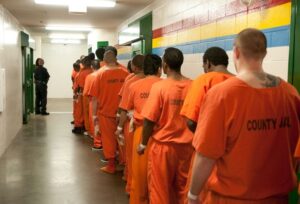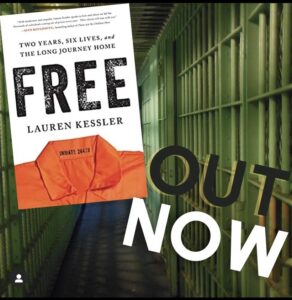Strangers in a strange land

Don’t try to imagine what life is like for someone who lives a quarter of a century behind bars. You can’t. And Hollywood or Netflix will not help you.
Yet I need you to think about that person who has lived in a cell for 25 years, who has worn the same blue/green/orange uniform every day, who has learned to respond to bells, to a number rather than a name, who must scan an ID badge every time to enter or leave a room, who queues up for meals, for showers, for medications, for an hour or two outside, who stands in line to make a monitored phone call, that person who waits to be escorted to a room to see, at a prescribed time, a father, a mother, their child, that person whose life has been ruled by routine and circumscribed by surveillance, who has learned the wariness of a caged animal, who no longer remembers how to make a decision, that person who has internalized the powerlessness of this life.
The effect of decades behind bars, of all of the above and more—language, posture, intonation, emotional and psychological bandwidth–is called “prisonization.” It is the process by which inmates adapt to prison life by adopting the mores and customs of inmate subcultures. It is the socialization of inmates to the culture of prison because that is their culture and because adopting its norms keeps them much safer than not.
They become who they have to become.
And then, one day, the gate opens, and they are free. More than 600,000 men and women make the journey from caged to free every year. Ninety-five percent of people who spend time in prison eventually get out.
You cannot imagine their life inside, but you can imagine what meets them once they’re out–because that’s the world you and I inhabit. It is a chaotic, fast-paced, tech-heavy world filled with people who have also internalized their culture, who know the rules (and which ones can be blissfully ignored), who know that acting independently and taking action is often the good and right thing to do. It is a world that presents us with up to 35,000 “remotely conscious” decisions every day—more than 225 of them about food alone. And we take this in stride.
Those just out the gate are truly strangers in a strange land. Do you wonder how they handle the everyday turmoil we take for granted? Do you wonder how they make their way? Do you wonder what it takes to reclaim—to reimagine—your life after long-term incarceration?
The six people who let me into their lives as they traveled this path will help you understand. I hope you read their stories.

Image courtesy of Maria Fowler (beauty.and.her.books on IG)






4 comments
Just stumbled on your blog and I’m much appreciating it. Will post this particular post in some reentry Facebook groups in Washington state.
Thank you for alerting me to wacorrectionswatch.org. I hope other readers will take a look as I have.
Please This book FREE needs to be in Paperback,
so I can send to a Loved one.
Thanks for the opportunity to explain, Denise: Books (commercially published ones, not self-published ones) are released in hardcover first. Many people like hardcover. But also, libraries REQUIRE hardcover. About one year after the release of the hardcover, the paperback is released. That means, for FREE, April 2023.
Leave a Comment